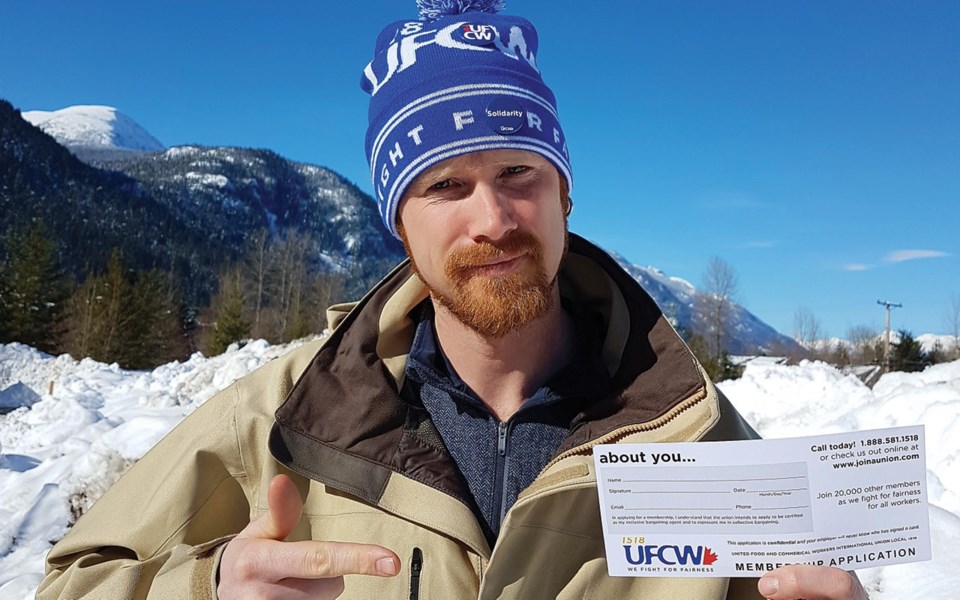In what is the biggest step yet in the Whistler Workers Alliance's push to unionize at Whistler Blackcomb, an application has been filed with the B.C. Labour Relations Board to certify the company's snowmaking department as a collective bargaining unit.
The application was filed last Tuesday, Jan. 7 by the United Food and Commercial Workers International Union (UFCW) Local 1518 to recognize the 30 or so employees in the snowmaking department, excluding millwrights and senior supervisors.
Snowmaking employees' main concerns surround overtime pay and general wage increases, according to UFCW union organizer Keith Murdoch. The base wage for snowmaking employees is $14.85 an hour, and tops out at $25, he said. Murdoch said department staff have also had to sign averaging agreements that mean overtime only kicks in after working 10 hours in a day, not the standard eight as set out by the Employment Standards Act. (After a request to confirm the above points, a spokesperson for Whistler Blackcomb said he was instructed not to say anything outside of the statement provided by Whistler Blackcomb parent company, Vail Resorts.)
"One of the reasons these workers have decided to unionize is because Vail [Resorts] has refused to listen to their concerns year after year despite their requests being sent up the line," Murdoch said. "Unionizing is the best option workers have when dealing with an employer who isn't reacting to issues [and] concerns raised by them."
In an emailed statement, Vail Resorts said it is "committed to an inclusive culture where our employees feel passionate, engaged and empowered. We encourage open conversations by engaging directly with our employees to ensure we are continuously improving all parts of the employee experience at Whistler Blackcomb. That said, our employees have the right to make informed choices on third-party representation and we will always respect that right and the choices they make."
The UFCW has been working with Whistler Blackcomb employees in some form since early 2018, when a small group of Snow School staff approached the union. Since dubbed the Whistler Workers Alliance, the group has set its lofty sights on potentially organizing WB's entire 4,000-plus workforce.
"Certainly we weren't limited to ski instructors or anyone else. We're just trying to make life better for all workers in Whistler," Murdoch said.
The logistics of such an ambitious union drive could prove daunting, however. Speaking with Pique back in 2018, UBC labour economics and relations professor Craig Riddell said the alliance could face a major hurdle obtaining the support of at least 50 per cent of WB's bargaining unit (meaning non-managerial staff) required to organize.
"It's a tough labour force to unionize because many of them are only here for short periods of time," he said. There were roughly 3,700 workers employed as first-time or returning seasonal staff at Whistler Blackcomb last winter.
The snowmaking department, by comparison, tends to see less turnover, which could make its organization effort more realistic.
"In this department, there is less turnover," Murdoch said. "But regardless of the transient nature or not, when workers look at their paycheques, they look at the cost of living in Whistler and they look at, for those who are there on a working vacation, if they are working multiple jobs and don't have any time to enjoy their working vacation; that's a problem. Our purpose is help find that work-life balance for folks."
If the snowmakers' effort is successful, Murdoch said the UFCW would look at other departments' union prospects on "a case-by-case basis."
"If we have 30 departments that are really interested, as well as feeling like we're able to move forward with being able to unionize them, then we will do them on a departmental basis. If we can do the whole mountain at once, then we would do that, but it's a huge undertaking, and there are a lot of challenges with coordinating," he said.
Snowmaking employees held a secret ballot on Monday, Jan. 13, with a majority needed to certify the union. At press time, the ballot boxes remained sealed, pending the outcome of a hearing scheduled for early February. Whistler Blackcomb has asked the LRB to review the application "because we don't agree with how the union has defined the bargaining unit and don't believe their definition is in the best interest of our employees," the company's statement concluded.
Based on a number of criteria, including similarity in skills, working conditions and geographical proximity, the LRB will now determine whether the snowmaking department is suitable for collective bargaining purposes.




